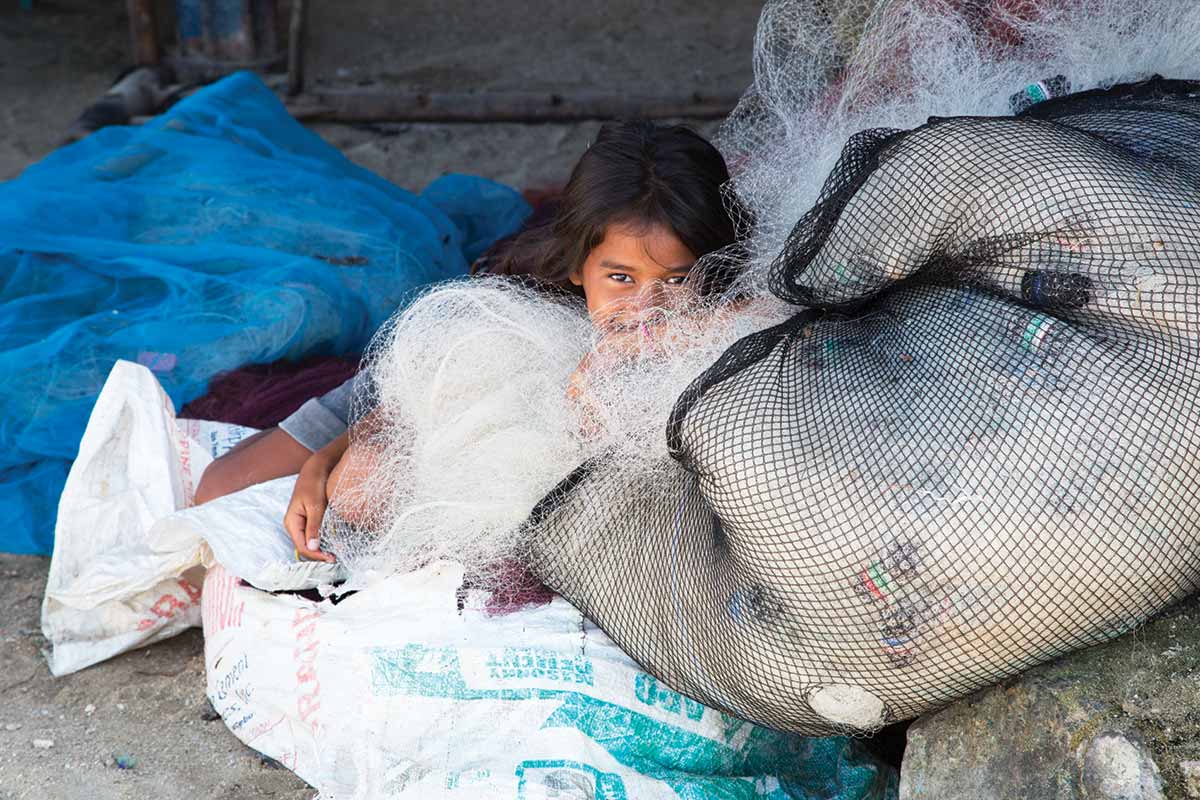G20 Executive Talk Series
September 2016
Branded Story / Interface
Authored by: Erin Meezan, vice president of sustainability for Interface, Inc.
From Negative to Positive:
The New Path of Sustainable Business
Interface relies on optimism to drive positive business with positive impacts.
Twenty-two years ago, an unlikely chain of events was set off in an unlikely place – in the heart of an ‘avowed capitalist’ – an entrepreneur who was, at the time, 60 years old and at the top of his career as the founder and CEO of Interface, a billion dollar commercial carpet tile company based in Atlanta. Today, that company finds itself on the brink of victory – poised to celebrate a key milestone in a journey to eliminate the company’s environmental footprint by 2020. And yet, ever restless in its quest to create a lasting positive impact on the world, the company has proposed a new mission to address the biggest challenge facing humanity: to reverse climate change. Erin Meezan has been at the helm of sustainability for the company for 7 years.

In 1994, our Founder and CEO Ray Anderson challenged our company to adopt a bold new vision, zero footprint.
His challenge was sparked by a personal epiphany, prompted by a question from a visionary project manager working on a green building. He asked, “What is Interface doing for the environment?” Spurred to answer this question, our founder created a task force and was asked to deliver the kick off speech. As he was thinking of his speech, a book landed on his desk – The Ecology of Commerce, by Paul Hawken. Hawken’s thesis was – and is – that the Earth and all of its natural systems are in decline, and that business and industry are
not only the culprit, but also the most well-positioned to reverse the damage. Ray was catalyzed by Hawken’s premise, and with the same entrepreneurial spirit by which he had built a market for modular carpet where none had existed, he challenged the company to chart a course forward, toward zero environmental footprint.
Interface didn’t have a map for zero footprint, but Ray’s vision was the compass. As the path unfolded before us, a passion
for this higher purpose of sustainability took hold with our people and our culture was transformed. We embraced that original vision to the point that it became part of our DNA, and over the last 22 years we have revolutionized our company, our operations and our products, deeply reducing the environmental impacts of our business and creating products that manifest our Mission Zero™. Along the way, innovative thinking has contributed to our bottom line, with products that have broken new ground in terms of design and performance, and created a support and love for the Interface brand that has been unprecedented.
By the numbers, some of the most significant accomplishments we have achieved to date include:
■ Greenhouse gas emissions reduced per unit of product 92% from 1996
■ Globally, 84% of energy used at Interface comes from renewable sources
■ Waste to landfill has been reduced by 91%
■ Water use reduced by 87%
■ 50% of the materials we use to make all our products are from recycled or bio-based sources
■ The carbon footprint of our products has been reduced by 50% since we started our sustainability mission
In a more abstract way – and perhaps a better measure of our impact – is the role we have played in proving what’s possible for business. We’ve been called “the most sustainable company in the world” and we’ve heard from countless companies about our role as a “case study” of sorts – an open and accessible example of what is possible when industry takes a broader view of its place in society.
As our zero footprint goal year of 2020 approaches, our focus is shifting from the focused drive to zero that has typified the first 22 years, towards the positive impacts we can create through our business to impact our people, our communities, and the world at large.
Shifting to Positive Business
As Interface is poised to achieve our zero footprint goals, we’re also mindful of a shift happening in the world – and in our business. The expectations of business are changing, away from a “responsible business” mindset to a positive impact approach. This thinking expects more of businesses than profitability and stakeholder engagement. It’s a way of thinking of business as a mechanism to deliver positive impacts, and as a way to solve bigger problems. At Interface, we’re excited about this shift to positive business.Positive business as an approach is still evolving. An exact definition doesn’t exist yet, but some important principles are emerging. One powerful principle is partnership and how companies must form relationships with other organizations to create more equitable and more significant impacts. In fact, according to the 2016 Sustainability Leaders study by GlobeScan and SustainAbility, sustainability experts believe that governments and the private sector equally share the responsibility for advancing sustainable development over the next two decades. In addition, multi-sector partnerships are seen as playing a critical role.
We’ve not only seen the power of partnerships to amplify our impact in our explorations of positive business, but we find it to be essential. Our Net-Works® project is a great example of making a positive impact. At its heart, Net-Works is a partnership with an NGO (the Zoological Society of London), a global yarn manufacturer (Aquafil), Interface and local communities in the Philippines. These partners came together to create an innovative supply chain program that harvests used fishing nets from the Danajon Bank as a source for recycled yarn for Aquafil, and ultimately Interface. Without the expertise, reach and resources of these organizations, Interface would not have been able to create a program that aspires to impact one million people by 2020.
It’s often one unique non-traditional member of these business partnerships — local communities — that illustrates another important principle of being a positive business: creating an inclusive approach. More specifically, this means ensuring that affected communities are involved in creating the positive effects. By working to involve local community members in the design and governance of the Net-Works program and by paying them for the net collection, Net-Works is creating a powerful newmodel of inclusive business.
![]() POSITIVE BUSINESSAS AN APPROACH IS STILL EVOLVING. AN EXACT DEFINITION DOESN’T EXIST YET, BUT SOME IMPORTANT PRINCIPLES ARE EMERGING.
POSITIVE BUSINESSAS AN APPROACH IS STILL EVOLVING. AN EXACT DEFINITION DOESN’T EXIST YET, BUT SOME IMPORTANT PRINCIPLES ARE EMERGING.![]()
Another idea we’re exploring at Interface illustrates a final principle important for positive businesses: using a restorative approach. This means making sure the solutions we deploy in our business are not just environmentally sensitive, but illustrate a restorative approach. In collaboration with Biomimicry 3.8, Interface is asking how we might operate our factory locations like a high performing ecosystem and provide similar services as local ecosystems to the places where we work. It sounds metaphorical, but we’re exploring standards for factory sites modeled on services of local ecosystems that will give us measurable goals and targets.
Driving Positive Impacts in the World
Interface has always been optimistic, beginning with our belief that our company could change, and later that we could be an example of sustainable business. It started with our commitment to climb what Ray Anderson described as Mount Sustainability – the analogy he created to impart the enormity of moving to a zero footprint company.
By setting a bold vision that inspired our company, followed by creating a plan to achieve it and not wavering, we’ve empowered our company and shown that optimism can lead to action and change. Fast forward 22 years and Interface is applying this same optimism to the next step on our sustainable business journey – Climate Take Back.

This next step is grounded in one simple reality – there is no such thing as a sustainable business in an unsustainable world. For all the progress we’ve made in 22 years, we’re still working in an unsustainable system. This is particularly true when you look at the threats we face from global climate change.
We need to start by changing how we think about climate change: it’s an opportunity, not a problem.
We need to consider new platforms to focus on reversing not mitigating it. Many of the tools already exist, other solutions are rapidly coming online. We believe we can reverse climate change if we focus on four key areas:
■ Only take what can be replaced and keep our emissions to levels that can be managed
■ See carbon as a resource and use it as a building block
■ Restore nature’s proven ability to cool, mimicking nature’s strategies
■ Create new business models to drive change
Expectations on business to drive sustainable development are rising, and those of national governments are declining, according to the 2016 Sustainability Leaders study. But, public and private industry partnerships continue to be critical for the ongoing success of positive business initiatives. We think this sends a clear signal to businesses about the need to adopt a positive business approach that sets more ambitious sustainability goals, like Climate Take Back – and seeks not just to minimize the impacts of businesses on the planet, but asks, how can we maximize the positive impacts of businesses?
This will require new partners, new approaches to business that are more inclusive and equitable, new ways of collaborating – through innovative, cross-sector, public-private partnerships. We need to look for new, innovative approaches to mapping how business can solve global challenges, perhaps by mapping business objectives to the United Nations Sustainable Development Goals as a starting place. We also need to create new ways to measure the impacts of positive business.
At Interface, we are taking the first steps to solve a big global challenge – climate change – that will require the collective abilities of many companies, NGOs and government bodies. We need to work together. It starts with us sharing our ideas and a plan for our business and partnering with global leaders to uncover ways they can begin to address this bold goal in their institutions.
We have taken a stand naming the bold goal of reversing climate change to start a different conversation, to create a sense of optimism and opportunity around carbon – and to work with others to identify and implement solutions that will get us there.
We have been successful leading by example in the past and we plan to approach Climate Take Back in the same way. And we’re ready for the world to join us.
As Vice President of Sustainability for Interface, Erin Meezan gives voice to the company’s conscience, ensuring that strategy and goals are in sync with the aggressive sustainability vision established in 1994. She leads a team that provides technical assistance and support to the company’s global business, addressing sustainability at all levels – from operations and management, to employees and customers, and in policy forums.
